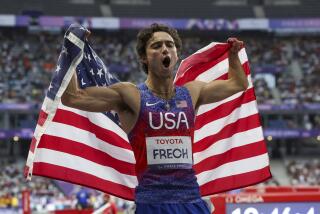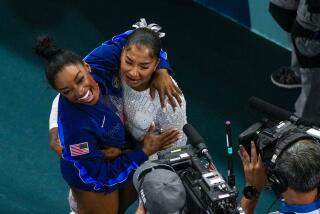They Anticipate Fun Will Come With the Games
- Share via
Among the thousands of athletes marching in the opening ceremonies of the 15th World Maccabiah Games in Tel Aviv on Monday will be two American teammates with starkly different perspectives on the proceedings.
Jennifer Frank will make her second trip to Ramat Gan Stadium for the quadrennial games. The Oak Park sprinter returns to defend the 100-meter title she won in 1993.
“It didn’t really sink in last time,” Frank said. “I’m a lot older and hopefully I will remember a lot more.”
Ryan Parmenter, a 16-year-old Valencia swimmer, sounds slightly more dazzled by his first Maccabiah.
“It’s gonna be huge,” he said.
The Olympic-style event, which runs through July 24, brings together 5,600 Jewish athletes from around the world. Teams from 53 countries will compete in sports ranging from basketball to ice hockey to taekwondo.
The U.S. team includes Frank, Parmenter and seven other athletes from the region.
David Waco and Laurence Rosenthal, both of Sherman Oaks, will play on the men’s softball team. Sarah Jacobs of Ventura will swim. The men’s volleyball team will include former Cal State Northridge All-American Coley Kyman, Michael Mesnik of Sherman Oaks, Neal Newman of Encino and Alan Segal of Calabasas.
They will participate in a world-class event, complete with thoroughly modern facilities and a national television audience in Israel. Much about these games have changed since their modest beginnings in 1932.
“The people in the first games had it primitive,” said Doris Beshunsky, an unofficial Maccabiah archivist.
Beshunsky is a former swimmer and relay runner who was among 21 U.S. athletes to compete in the 1936 games. Whereas Frank and Parmenter made the trip by plane, she traveled by boat in what she called “a third-class cruise for two weeks.”
Instead of arriving at a bustling city, Beshunsky and her teammates encountered a Tel Aviv that was a dusty village of 20,000. Israel was yet to be created. The region was known as Palestine.
Whereas Frank will run on a synthetic track, Beshunsky ran on dirt. Whereas Parmenter will swim in an Olympic-size pool, Beshunsky competed in less-optimum conditions.
“They hadn’t quite finished the pool,” she recalled. “If you were in the outside lane, you had to be careful because it was a little crooked.”
Despite the improvement in athletic facilities, not everything about the modern games is better. These days, the athletes must be concerned for their safety.
“There’s always someone in an army uniform who goes with us on the bus,” said Mel Rosen, the U.S. team track coach. “We know certain rules to follow. You don’t go out by yourself. You don’t go to the West Bank.”
But some aspects of the games have not changed. Beshunsky recalls arriving in the port of Haifa and being greeted by boys and girls from a nearby kibbutz who sang and waved an American flag.
“I don’t have to tell you how I felt,” she said.
Frank experienced similar delight when she traveled to Israel for the 1993 games. The U.S. team spends a week before the competition touring the country.
“I got to see my heritage,” Frank said.
Just as Beshunsky formed friendships with her competitors, Frank tells of socializing at the hotels where the athletes stayed. At the Maccabiah Games, competitors are housed by sport, not country.
“Everyone wants to get to know everybody,” Frank said. “We spent a lot of time hanging around the pool. There’s a lot of clothes trading. You come back with clothes from 15 different countries.”
Parmenter worries that he doesn’t speak Hebrew. But his swimming coach at Hart High doubts that will be an obstacle.
“Ryan won’t have any problem meeting new people,” Coach Steve Neale said. “He told me his goal was to get the most T-shirts from foreign countries.”
The games were designed to unite Jews from around the globe, emphasizing culture alongside competition. Named for Judah Maccabee--who won a number of battles against invading forces around 167 B.C.--the inaugural games drew 300 athletes from 13 countries.
After Beshunsky competed in 1936, World War II forced the postponement of the Maccabiah Games for 14 years.
But after their resumption in 1950, the games grew steadily. Among the world-class American athletes who have competed in Tel Aviv are swimmer Mark Spitz, gymnast Mitch Gaylord and tennis player Brad Gilbert.
Beshunsky, 81 and living just outside Philadelphia, marvels at the growth of the games. The 1936 team did not even have uniforms.
“Somebody found a man in Tel Aviv, a tailor, and he made us all uniforms,” she said. “We got dressed under the bleachers so we could march in the opening ceremonies.”
Although these games will be vastly different in size and appearance, Frank expects they will be similarly exhilarating.
“A time to be remembered,” she said.
*
Staff writer Michael Lazarus contributed to this story.
More to Read
Go beyond the scoreboard
Get the latest on L.A.'s teams in the daily Sports Report newsletter.
You may occasionally receive promotional content from the Los Angeles Times.







